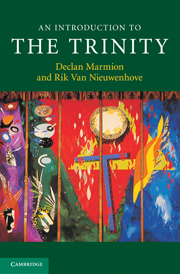Book contents
- Frontmatter
- Contents
- Abbreviations
- Acknowledgements
- 1 Introducing trinitarian theology
- 2 The Trinity and its scriptural roots
- 3 The doctrine of the Trinity: its emergence and development in the life of the Christian community
- 4 Theology of the Trinity from Richard of St Victor to the Reformation
- 5 The Trinity from Schleiermacher to the end of the twentieth century
- 6 Contemporary trinitarian theology: problems and perspectives
- Epilogue
- Index
- References
4 - Theology of the Trinity from Richard of St Victor to the Reformation
Published online by Cambridge University Press: 05 August 2012
- Frontmatter
- Contents
- Abbreviations
- Acknowledgements
- 1 Introducing trinitarian theology
- 2 The Trinity and its scriptural roots
- 3 The doctrine of the Trinity: its emergence and development in the life of the Christian community
- 4 Theology of the Trinity from Richard of St Victor to the Reformation
- 5 The Trinity from Schleiermacher to the end of the twentieth century
- 6 Contemporary trinitarian theology: problems and perspectives
- Epilogue
- Index
- References
Summary
In the next two chapters we will give a historical overview of the developments of the theology of the Trinity from the medieval period until today. Most textbooks claim that in the medieval period two distinct models of trinitarian theology were developed. The first model is usually called the intrapersonal model (or the psychological model). This model draws its inspiration from the analysis of the mental processes of intellect and will. The other is usually called the interpersonal model: this model generally attempts to portray the Trinity in terms of the loving encounter of three ‘Persons’.
We will first discuss the theology of the Trinity of Richard of St Victor, who sees the Trinity in terms of a community of love. St Bonaventure (who was both an academic theologian and a mystic) adopted some of the key ideas of Richard, but he also drew on St Augustine's theology of the Trinity. This observation is not without significance, for it illustrates that the two models should not necessarily be regarded as mutually exclusive. The Augustinian approach was further developed by Aquinas, the greatest of the scholastic theologians. We will also examine the thought of Jan van Ruusbroec, who presents us with a beautiful and dynamic theology of the Trinity, which is of immediate relevance to Christian spirituality.
- Type
- Chapter
- Information
- An Introduction to the Trinity , pp. 96 - 141Publisher: Cambridge University PressPrint publication year: 2010



